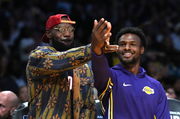
Imago
Oct 25, 2024; Salt Lake City, Utah, USA; Golden State Warriors head coach Steve Kerr looks on against the Utah Jazz during the first quarter at Delta Center. Mandatory Credit: Rob Gray-Imagn Images

Imago
Oct 25, 2024; Salt Lake City, Utah, USA; Golden State Warriors head coach Steve Kerr looks on against the Utah Jazz during the first quarter at Delta Center. Mandatory Credit: Rob Gray-Imagn Images
Steve Kerr has truly achieved it all in basketball, both as a player and a coach. Yet, like many, he faced profound tragedy early in life. As a freshman at the University of Arizona, Kerr endured a loss that few can imagine: the murder of his father, Malcolm H. Kerr, who was serving as the president of the American University of Beirut (AUB). Malcolm Kerr was shot by unknown assailants, believed to be Islamic extremists, and this tragic event forever altered the course of Kerr’s life.
Watch What’s Trending Now!
Talking about how this tragedy shaped him as a person, Steve shared his thoughts in an interview with 60 Minutes on YouTube, “when it happens for me at 18 when it happens early in your life, it gives you a better awareness of how fragile everything is and so when you when you get to a good thing you want to hold on.” He reflects on how losing his father at such a young age changes your perspective in life.
ADVERTISEMENT

Kerr often shares how this experience shapes his coaching philosophy—not only emphasizing basketball skills but also imparting life lessons to his players. Thanks to his father, Kerr was exposed to diverse cultures and perspectives from a young age, saying, “I was born in Beirut; we lived in Egypt, France, and Tunisia, so I got a pretty worldly education early on.” Indeed, Kerr’s Lebanese birthplace is a little-known fact, sparking curiosity about his family roots, ethnicity, and background. Let’s dive deeper to uncover more about the rich heritage and unique influences that shaped him.
ADVERTISEMENT
Is Steve Kerr Lebanese?
Steve Kerr was born on September 27, 1965, in Beirut, Lebanon, but he is of American descent. Both of his parents, Malcolm H. Kerr and Ann Kerr (formerly Ann Zwicker), were American citizens residing in Lebanon. Despite his birthplace, Kerr holds American citizenship and has always embraced his heritage, often speaking out on various social and global issues.
ADVERTISEMENT
Steve Kerr’s family roots
Steve Kerr’s deep connection to Lebanon traces back to his grandparents, Stanley and Elsa Kerr, who left the United States to settle in Beirut, where they taught at the American University of Beirut (AUB) for over 40 years. Steve’s father, Malcolm Kerr, was also born in Lebanon and became a respected American academic.
Malcolm met Ann Zwicker, also American-born, at AUB, where they were both studying. The family returned to California when Steve was a toddler, though Malcolm would later return to Beirut in 1982 to serve as AUB’s president. Tragically, on January 18, 1984, during the Lebanese Civil War, Malcolm Kerr was assassinated by suspected extremists. This profound loss had a lasting impact on Steve and his outlook on life.
ADVERTISEMENT
His Philanthropic Works
Steve Kerr has always been vocal against several issues but speaking against gun violence has been his top priority due to his personal experiences in the past. His father’s loss played a major role in shaping his worldview and that is something he takes very seriously. In 2022, before game 4 of the Western Conference finals, Kerr did not want to talk about basketball instead he put up an emotional plea for gun control. “When are we going to do something?” Kerr yelled and added, “I’m tired. I am so tired of getting up here and offering condolences to the devastated families that are out there. I am so tired of the excuse, I am sorry, I am tired of the moments of silence. Enough!”
Top Stories
Kyrie Irving Breaks Silence After Injury Return Update Emerges

Is Jaylen Brown Dating Kendall Jenner? Fact-Checking Viral Claim About Celtics Star

LeBron James Sends 5-Word Message After Bronny James’ G League Season-High Score

JJ Redick Under Fire After Blaming True Culprit Behind LeBron James & Lakers’ Troubles

Iowa Launches Something for the First Time Ever in Caitlin Clark’s Hometown

Steve Kerr – who is speaking now – had used his influence to advocate for more gun laws. Here he is after the tragedy in Uvalde.#DNCConvention2024 pic.twitter.com/slBfAolDRn
— Martine St-Victor (@MartineMontreal) August 20, 2024
ADVERTISEMENT
Steve Kerr has consistently used his platform to address social issues, believing that speaking out can inspire change. His advocacy includes partnering with Brady, a nonprofit dedicated to gun reform, where he pledged to match the first $100,000 donated to Live Free, an organization focused on building violence-free communities. Kerr and his wife, Margot, have also supported educational initiatives for underrepresented and minority groups.
Beyond these efforts, Kerr is actively involved in healthcare initiatives, disaster relief, mental health awareness, and programs for children’s welfare and education. Open about his own experiences, Kerr has shown resilience and a dedication to improving lives, working tirelessly to create a positive impact in his community and beyond.
ADVERTISEMENT
ADVERTISEMENT
ADVERTISEMENT

